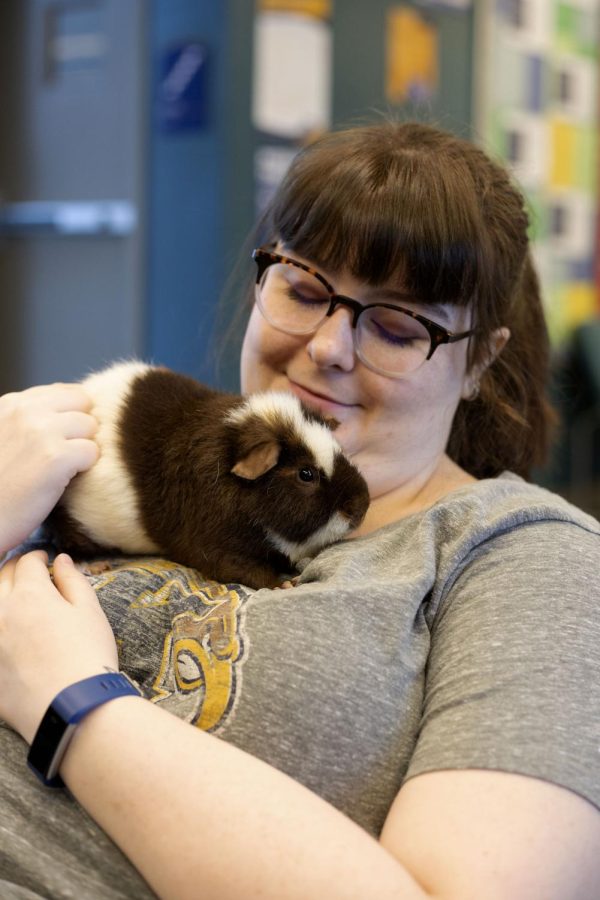Support animals help students tackle the day
Senior advertising major Emmaline Mae Stine cuddles with her service animal Oliver. Oliver is her service animal of two years.
Correction: The story was changed to more accurately identify service animals vs. assistance animals
“I’ve seen people who could honestly benefit from having a service dog,” said Kat Gauding, a sophomore VCD major. Loyal and right by her side is four legged Archer. Archer is an assistance dog who spends all of his time right by Gauding’s side.
Any breed can be an assistance animal, Gauding said.
There are many ways an assistance animal can be trained and the process usually varies between each animal and their owner. Many programs allow for service dog training with the goal the pet will aid someone with a disability in the future.
Although these programs can be successful, psychiatric service dogs need more specific training.
“I saw a blog for different handlers [that said] psychiatric service dogs are better trained by their owner mainly because there’s no guarantee that a dog trained by a specific company would be able to bond with you,” Gauding said.
Through Archer’s training, he has acquired many skill sets that could potentially save his owner’s life.
“My anxiety and my panic attacks make it very difficult for me to want to be out and about and doing things by myself,” Gauding said.
With Archer’s help, Gauding is able to manage her anxiety and panic attacks. Archer specializes in deep tissue therapy and alerting. When he picks up on a change in Gauding’s heart beat, he knows to alert her because that change can lead to anxiety attacks.
With Archer’s help, Gauding can prepare for these attacks. In an attempt to distract Gauding from her attacks, Archer showers her with kisses.
“He does help me get through them and help lessen the effects so they aren’t as bad,” Gauding said.
Madison Flagg, a senior special education major, is the current co-director of communications for the organization Paws for a Cause. The on-campus organization is affiliated with Four Paws for Ability.
“They raise and train service dogs for children with disabilities or veterans who have PTSD,” Flagg said.
The dogs are trained by volunteers for a full year before learning specific training and skill sets.
“It’s sad to give them back, but I can imagine the bigger picture and it’s really rewarding,” Flagg said.
There are also emotional assistance animals which help owners with everyday life.
“I never thought when I went to get an emotional support animal, I was going to get a guinea pig,” said Emma Stine. Emma is a senior advertising major and Oliver the guinea pig lives with in her dorm. Stine said Oliver is a great alarm for her in the morning.
“He starts screaming and running around because it’s biscuit time,” Stine said.
Although Oliver did not have “training” he helps Emma constantly.
“If I’m having a really bad day, I still have to get up and take care of him regardless of what’s going on,” Stine said.
Oliver assists Emma every day by helping her follow her daily routine. On a normal school day, Emma leaves SpongeBob Squarepants on for Oliver while she ventures to class. When she returns, Oliver joins Emma and her friends for homework and more TV.
“He’s here to keep my routine in order and to give snuggles,” she said.
Taylor Peach covers student affairs. Contact her at [email protected].



